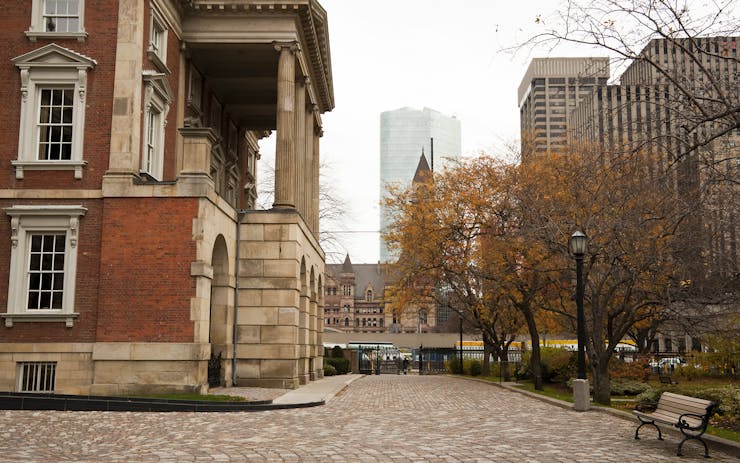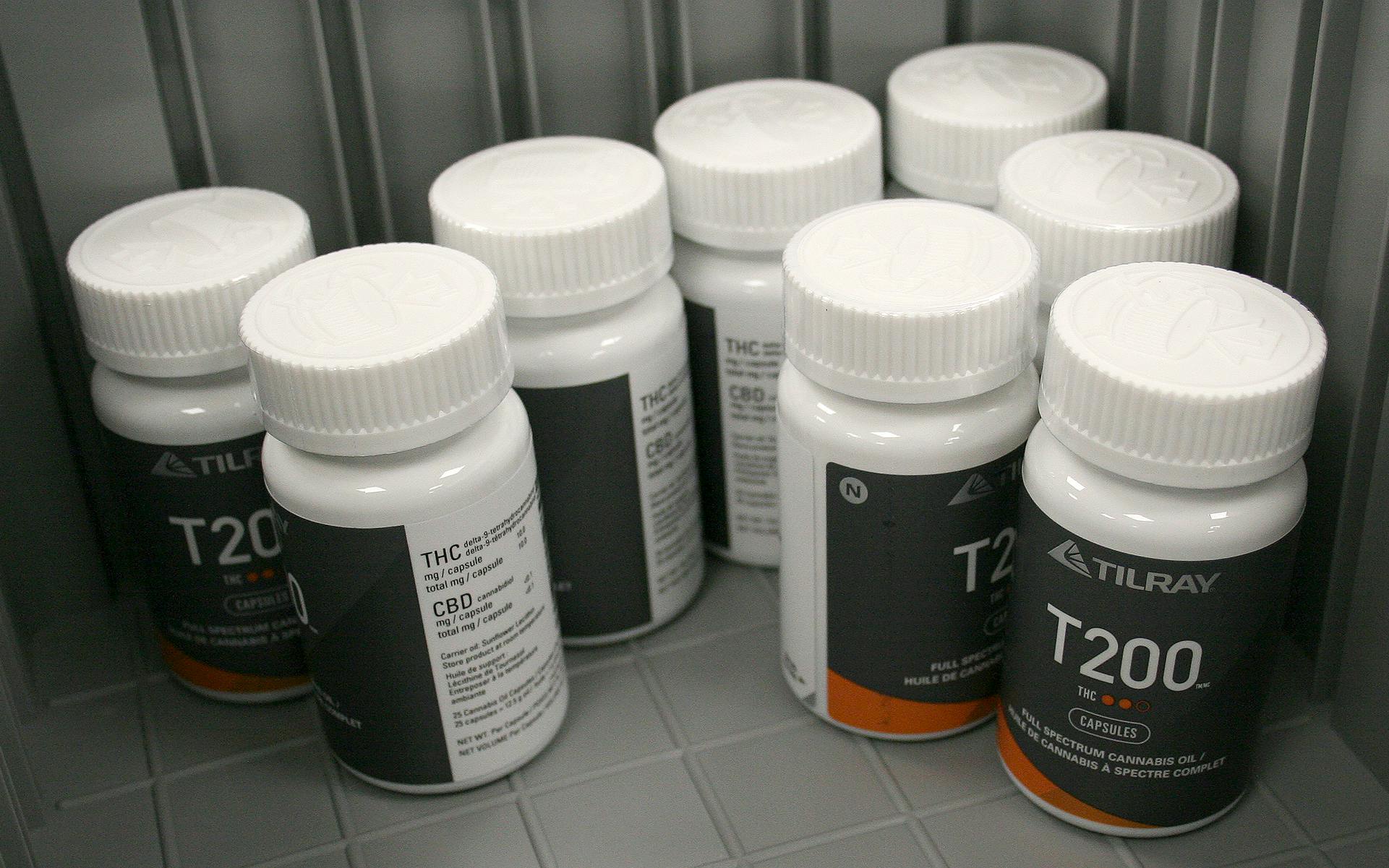It’s Monday morning, September 25, in courtroom number nine in Toronto’s Osgoode Hall, and lawyer Paul Lewin is sweating.
He reaches into a green Kleenex box and dabs his brow. Outside, it’s oppressively humid and the lawyers, still arriving, carry warmth into the room as they enter. They settle in and lift heavy binders from their large wheeled briefcases, their faces glowing under the courtroom lights. Lewin pours a glass of ice water. “Gin and tonic pull?” he says, offering the cup to a member of his counsel.
The city is seeking an immediate closure to the Canna Clinic dispensaries. Lawyers are attempting to intervene on behalf of 14 medical cannabis patients.
Lewin and co. are metaphorically steeling their nerves for what is to follow, a two-day hearing that pits the City of Toronto against Canna Clinic, with precedent-setting implications.
The city is seeking an immediate closure to the Canna Clinic dispensaries that are operating within the municipality. Lewin and his counsel are representing Canna Clinic and attempting to intervene on behalf of 14 medical cannabis patients. They’ve also filed a separate motion of notice to the court, challenging the constitutionality of the Access to Cannabis for Medical Purposes Regulations, which doesn’t include dispensaries. Dispensaries, they will argue, are part of reasonable access.
At one point, Canna Clinic, a British Columbia-based company, had seven dispensaries operating across Toronto. After repeated raids, they are currently down to two storefronts, one of which was raided in early September, with police seizing nearly 500 pounds of bud, oil, and shatter. If the city is successful in seeking an interim injunction, it will shut down the dispensaries in a way that repeated raids have, so far, been unable to.
“This is the big one,” Toronto cannabis lawyer Jack Lloyd said in the days leading up the hearing. “It’s really going to be the determinant of the future of dispensaries in Ontario.”
The Mail-Order Mess
On Monday morning, Lloyd settles into the back row of the small courtroom, sandwiched between a couple of journalists. A number of lawyers are here to watch the proceedings and with every seat taken they lean against the walls, or sit on the floor, laptops and notepads propped up against their knees. Tomorrow, to accommodate the crowd, the hearing will be moved to a larger room on the second floor.
There is greater harm in closing the dispensaries, the lawyers imply, then letting them operate—even if the government is uncomfortable with their presence.
Lewin is addressing the judge. He says she will hear two recurring themes from his side, the first being that all the problems with Canada’s medical cannabis regime stem from the broken mail-order system. He will also argue that the people who are affected by shuttered dispensaries are society’s most vulnerable. There is greater harm in closing the dispensaries, this argument implies, then letting them operate—even if the government is uncomfortable with their presence.
The mail-order system, Lewin argues, strips patients off on-demand access to cannabis, which can lead to hospitalization and long-term health issues. He cites a patient with Crohn’s disease, who waits on average three to five days for his medicine to arrive by mail. Because he lives in a shelter, this means he has to wait outside, sometimes for eight hours, to sign for his package. He has ended up in the emergency room as a result of delayed treatment.
This is not unique, Lewin says. There are many others in similar situations, where one miscalculation on an order form, one delay, can send them to the hospital.
There are also economic challenges to the mail-order system. Patients need a computer, and computer literacy and payment options are limited, requiring a bank account or a credit card. Canada’s licensed producers of cannabis (LPs) also require minimum purchase orders, on average $75 per order. For those on a fixed income, meeting minimum order requirements is impossible. With storefronts, a patient can access some form of relief with a few dollars, money that would mean nothing to an LP.
Patients are also bound to the LPs they are assigned to, and they can be fired from their service. If a patient wants to switch producers, maybe because they find their LPs prices too high or they are not satisfied with the product line, it’s a tangled three- to six-week process, with paperwork, doctors visits, and services fees ranging from $50 to $100.
Another byproduct of the mail-order system is packages go missing, often with no refund. There is also, of course, the fact that many don’t want to receive their medicine in the mail, where it can be publicly displayed on their front porch.
“You can even get opioids at a storefront, but only cannabis is so special that it has to be delivered by mail,” Lewin says. Lloyd, watching in the back, pleased with this point, can’t help but pump his first.
A City’s Discontent
In contrast, the city argues that medical access is a ruse, that this is really about Canna Clinic’s private interests and revenues, citing that the seven locations were averaging around $3.5 million in business a month.

(Courtesy of Canna Clinic Toronto)
Canna Clinic, the city argues, also denied their attempts to gather evidence. They refused the city’s request for patient medical records, even anonymized records. In the end, the city received one record out of more than 19,000 members.
There is no information about where Canna Clinic’s product is coming form, or documentation about its clients needs for medical cannabis. Financial disclosures were also refused.
“Canna Clinic’s requirements don’t come close to what courts require of medical clinics,” the city argues. They say nothing is done to confirm a medical diagnosis, no information is sent to any doctors, and there is no information about dosages or any time limitations on membership.
Shop highly rated dispensaries near you
Showing you dispensaries nearLater, the judge describes the lack of information about how Canna Clinic operates as a problem for Lewin and his counsel. (“You give me zero evidence and you’ve basically shielded yourself. That’s not good.”)
The city also argues that after repeated raids and bylaw breaches, the dispensaries remain open, which leads to a waste of resources when they are inevitably raided again. They argue that the primary activities of the dispensaries have nothing to do with medical cannabis, that it’s only incidental based on the number of members. There is no constitutional right to access via dispensary, the city says.
“The federal regime provides that access,” the city argues. “If we authorize them to continue, we authorize their practices without regulation.”
Does a Win for Dispensaries Require an Activist Judge?
Last month, in a case in Hamilton, a neighboring city of Toronto, a judge allowed a dispensary to remain open provided it only sells cannabis to medical patients. The City of Hamilton had been seeking to shut it down. When this case is raised in court on the second day, the judge appears indifferent.
“I don’t care what’s happening in Hamilton,” she says, leaning back in her chair, arms spread at her sides to emphasize her point.
The City continues, “The government of Ontario made it clear that they expect the new system be run under government authority,” they say. “So illicit cannabis dispensaries are not legal now and they won’t be legal then.”
If the judge rules that dispensaries can remain open, she would be overriding three levels of government that want the dispensaries shuttered.
When the hearing closes on the second day, the lawyers and journalists and spectators stream out of the room. One of those lawyers is Russell Bennett, who represents a few dispensaries in the city and made the 1998 documentary, STONED: Hemp Nation on Trial, which aired on the CBC.
“It’s not looking good for the dispensaries,” he says, noting that the impression he got, when the judge was speaking and taking notes, was that she might be building a case against the dispensaries. If the judge rules that the dispensaries can remain open, she would be overriding three levels of government—municipal, provincial, and federal—who have all made it clear they want the dispensaries shuttered.
“This would be a large political statement form the judge,” Bennett says. “It would be a huge political stance.”
Despite Canada’s government promising to legalize cannabis by July 2018, they have also encouraged hundred of raids across the country since taking power. Simple possession arrests have also continued. Currently, there are an estimated 60 to 80 dispensaries operating in Toronto, but the clock is ticking. How much time they have left is anyone’s guess, and up to the judge now. There is no timetable for when she will make a decision.
“The beating heart of this case,” Lewin said at the end of the second day, “is the fact that the mail-order system is not working and if the Canna Clinics are shut down its going to be the sickest, oldest, poorest, the most vulnerable who are going to suffer greatly.
“I think years from now we’re going to wonder what all the fuss was about.”







